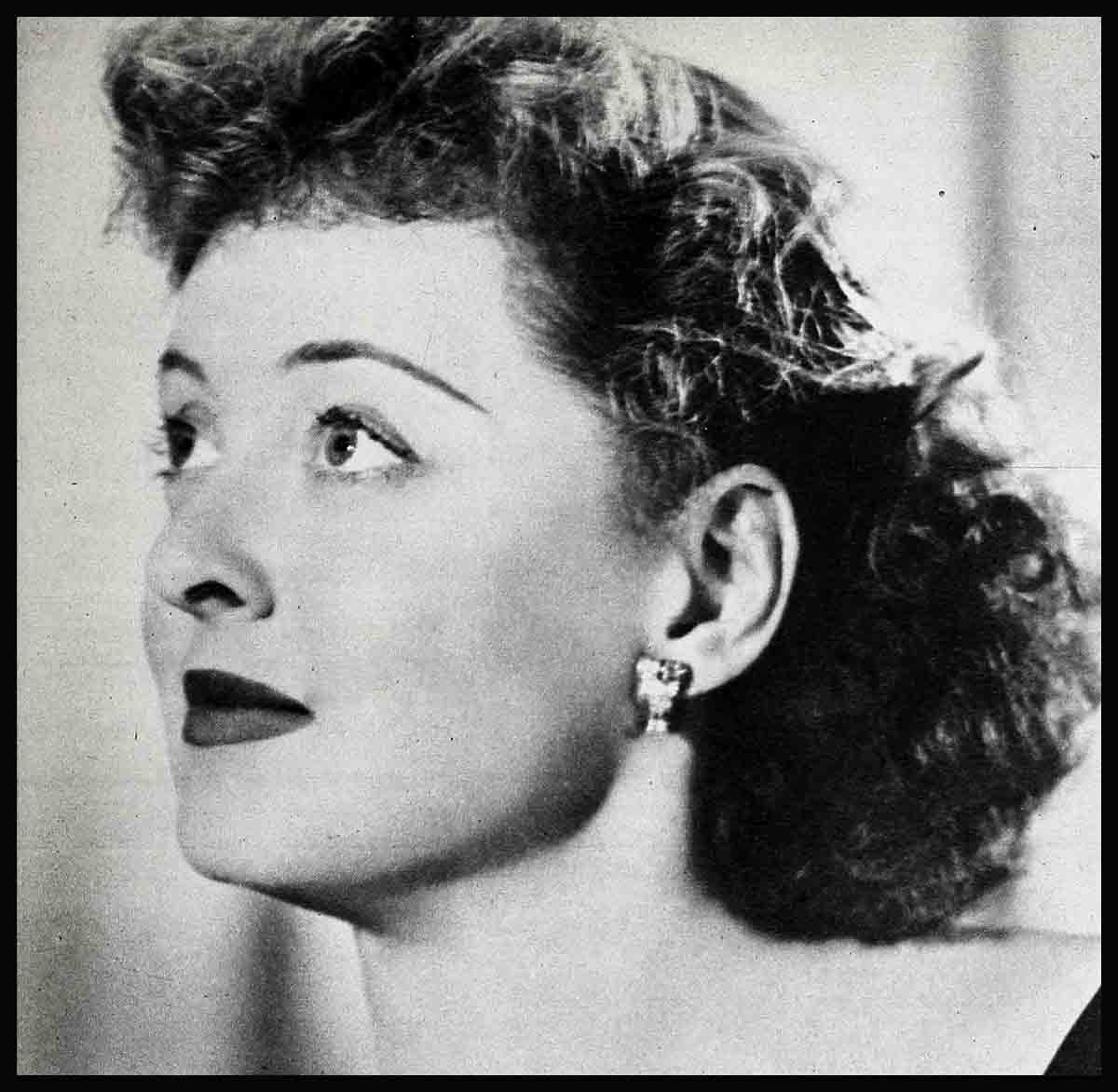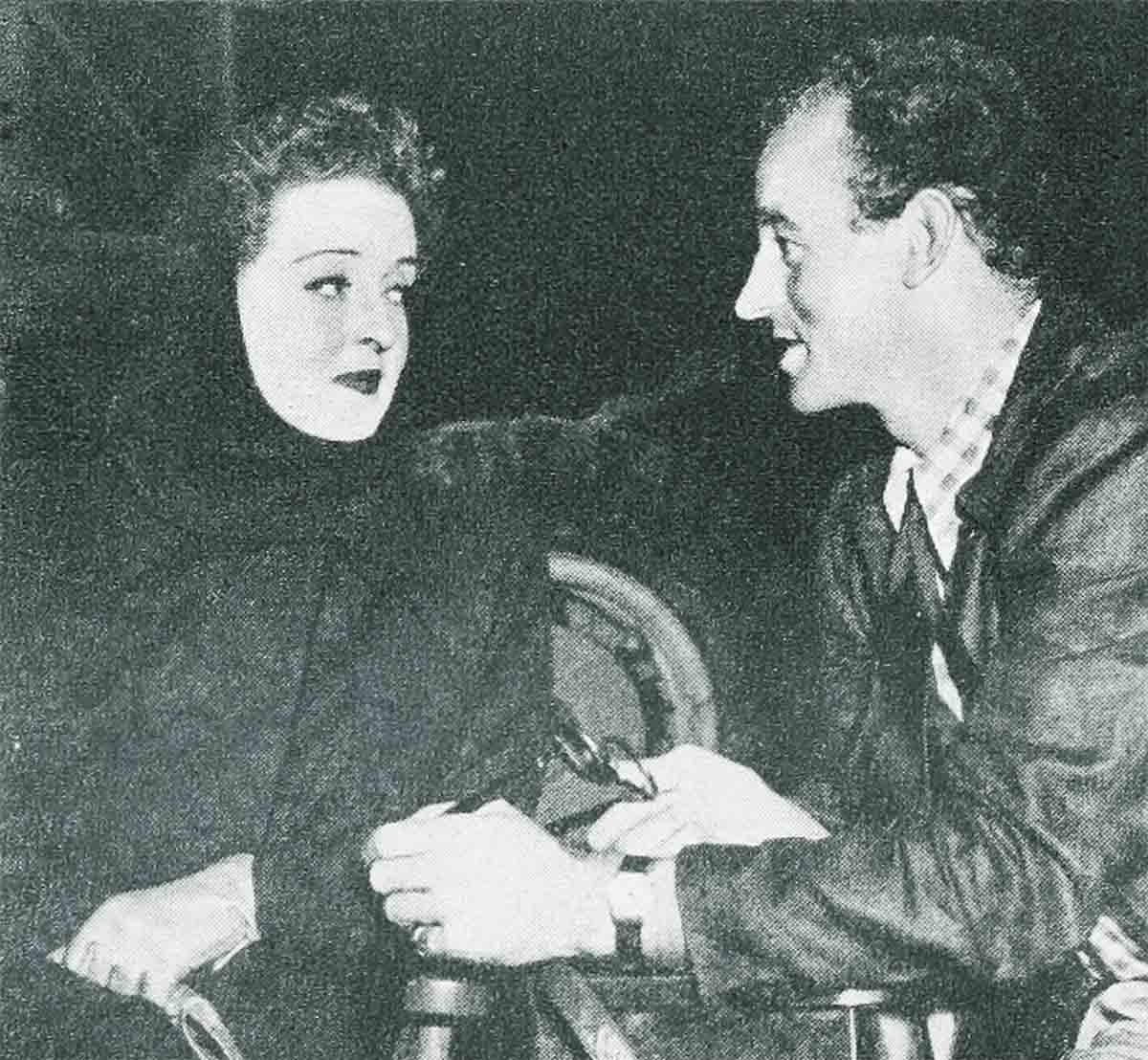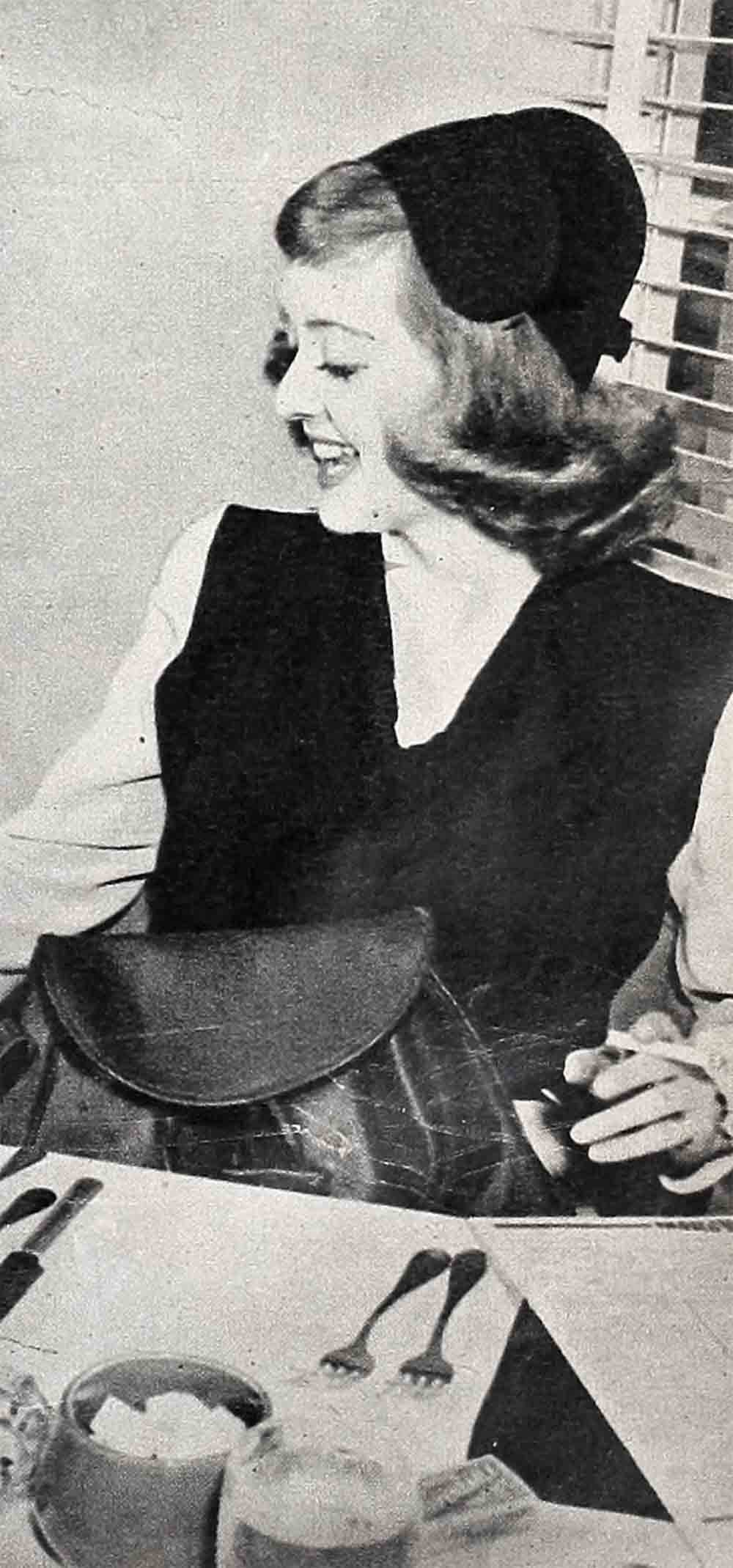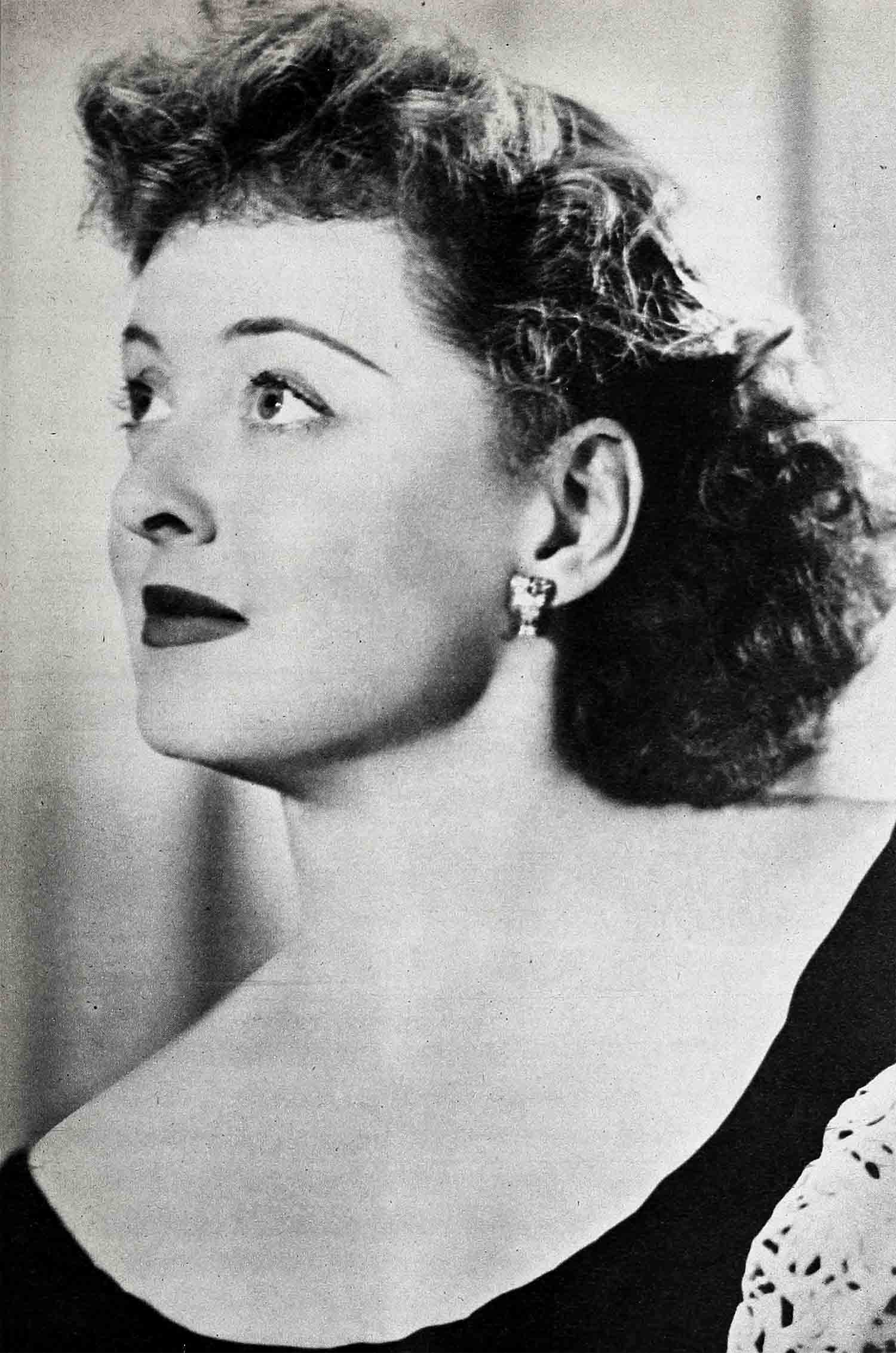
Bette Davis: “My Baby Will Be A Yankee”
The expected baby in the life of Bette Davis is the greatest thing that has ever happened to her, and that includes career, screen triumphs and her many charity organizations.
It was a softer, gentler Bette that came to my house for dinner with her husband, William Grant Sherry—a girl who is happy and has finally, after a long time, found what she has been seeking. Between the flickering candles on my dining-room table, Bette’s face was framed as though an artist had lined up a “shot” of one of her own film dramas. I thought, as I looked at her, this girl and I have had our tiffs in the past. I’ve lost my temper with her and she’s told me off in that brittle, staccato manner that only Bette Davis can make you take and like.
But when I got the tip that she was going to have a baby, I called her. “Bette,” I said, “I hope this is true. I know what it will mean to you to have a baby. I want you to let me break this story and share your happiness with everyone. And it’s time you and I are friends again.”
“It’s true, Louella,” she said, “—and thanks for what you have said. We should be friends again.”
And so, two nights later, Bette and her tall, slender husband, William Grant Sherry, came to have dinner with Dr. Martin and me—just the four of us. Of course, I wanted to talk to her about many things—about the baby, and her supposed feud with Joan Crawford and her plans for the future. I also wanted very much to meet the man she married. But, above all, it warmed my heart to have Bette at my home again—a friend.
I knew her well when she was married first to “Ham” Nelson and later to Arthur Farnsworth, and she never achieved this poise and inner serenity with either one of them, nor the happiness that is so evident now.
I don’t know when I have enjoyed a dinner more. We were very gay. Like good wives, Bette and I listened to the war talk of our men, both of whom had served overseas. We listened to fight talk, to art talk and many things that did not verge on Hollywood shop chatter. It amused me that Sherry doesn’t “yes” Bette. He’s devoted to her, but he has definite interests far removed from her work and her studio problems.
He isn’t a good-looking man in the accepted Hollywood sense of the word. But he has real charm and attractiveness. He leads his own life independent of Bette’s. An artist, with a definite leaning toward medicine, Sherry had done fascinating work sketching operations for the Medical Corps during the war.
“How gruesome!” I gasped—and got a look from my doctor.
I said to Bette, “This is time for you and me to have our coffee together and leave these men alone.”

So as we sat down cozily tete-a-tete in the living room, naturally the baby was uppermost in our minds. Bette had said when she knew that she was to have a baby that her child should not be publicized and that any interviews would not be on Bette the mother, but rather on Bette the actress. That’s because she felt her coming baby was a very personal matter. But she and I could no more help talking about this new happiness in her life than she can help being a great artist.
I told her then I was sorry that the story about her expected baby broke the very same day that her ex-husband Ham Nelson applied for a marriage license to wed a twenty-two-year-old newspaper writer named Ann Roberts, and that the two “features” had appeared side by side. “Oh, that’s good journalism,” she tossed it off, laughing, which was not like Bette, because believe me, I know that this New England born and bred girl has a decidedly conventional and proper side.
When “Ham” Nelson told her the day they both knew their marriage was over that if she didn’t divorce him he would divorce her, she had said, “Go ahead. I don’t believe in divorce. If you want one, you’ll have to get it yourself.” And to everyone’s surprise, he did just that.
But it wasn’t the past that was interesting Bette tonight. Not good looking Ham Nelson who caused her so much unhappiness or poor Farney who died after a tragic fall in August of 1943. Her whole thoughts are centered on the baby she and Sherry will welcome next spring.
“I hope it will be a girl,” she said with the calm directness that is so much a part of her. “I wouldn’t know how to manage a boy. But Sherry is so set on a boy he won’t even discuss a girl’s name. I just ignore him and go on planning names. If it’s a boy we’ll call him William Grant Sherry Jr. If it’s a girl, Lynn Sherry.”
“Not Bette Jr.?” I was surprised.
“I don’t think so,” she mused. “Many people mispronounce my name and call it ‘Bet’ because of the spelling. It’s really just as though it were spelled ‘Betty.’ No one can mispronounce Lynn . . . No, it is not a family name—but Sherry’s father always wanted a girl. He had only sons, and he said, ‘If I ever have a girl, I’ll call her Lynn.’ So, if we have a girl, that will be her name in memory of Sherry’s father whom he loved dearly.
“Sherry and I are going back to New Hampshire to await the birth of the baby,” Bette told me. “You know, I have to have my baby born a real Yankee. I wouldn’t feel it—and yes, I call it ‘it’—was a real Yankee unless it’s born in a New England state.” Bette was born in Lowell, Massachusetts.

“Have you made any plans about bringing ‘it’ up?” I laughed.
“How could I, so soon?” she replied. “The idea of being a mother is so new to me.
I have to get used to it first. The other day, a group of telephone operators at Warners sent me a little baby jacket. I looked at it in surprise. For a minute I thought, ‘This must belong to someone else.’ And then I realized it was for me—Bette Davis Sherry—I am going to have a baby after all these years. Louella, I’ve wanted one so much—so very much.”
Was this girl, with the soft glow in her eyes, the Bette Davis I had known in the past, the brittle Miss Davis with her sophisticated way of smoking a cigarette and her short, clipped manner of speaking? It was not!
She’s going to spoil a baby just plain out of this world. She’s going to be so awed before the miracle of it that her whole life will be centered in a baby’s tiny fists. And what’s more—no paid nurse is going to have the big thrill of taking complete care of “it.” Mrs. William Grant Sherry is going to be a mother who is a mother! I’ve always said that these so- called “career women” are the most tender and devoted mothers in the world.
But, because she is reserved, a great deal of what Bette feels must remain a secret in her heart. Out of the blue, I asked: “What’s all this about you and Joan Crawford?”
My guest didn’t bat an eyelash. “You know,” she said, “Joan asked me the same thing. I know her very slightly. But I think the first thing that irked her was because I have had a cameraman for years named Ernie Haller. He’s the best cameraman on the Warner lot—for me at least—and I’ve always refused to make a picture without him. Joan had the same idea, for which I can’t blame her, and when she found he was busy with me, it seemed to upset her. That, honestly, is all I know. There’s room enough on the Warner lot for both of us, goodness knows. There’s room enough in Hollywood for all actresses.”
I persisted, “But what about the battle over whether your picture, ‘Deception’ or Joan’s picture, ‘Humoresque’ should be released first?”
“Oh, that’s very silly. I can’t tell you how much I was against Warners’ great hurry to get ‘Deception’ out. We rushed like mad to finish it and believe me, it wasn’t any of my doing. You know how fussy I am about my pictures— and how I want them to be as perfect as possible. But I believe Paul Henreid, Claude Rains and I had a wonderful script and the picture turned out well in spite of the rush.”
“Is this a film you produced yourself, Bette?” I asked.
“No,” she replied, “and between you and me, as long as I remain at Warners, I’m not going to produce any more pictures.”

“Stolen Life” had been a picture she produced as well as starred in, and I asked her if she did not like it.
“Yes,” she said, “but I’m afraid they don’t take me seriously as a producer. I’ve been under, contract to Warners ever since I was a kid and they think it’s funny for me to be a producer after fifteen years on the lot.”
“Good heavens! Is it fifteen years?”
She smiled, “Yes, and in spite of the tiffs we have had now and then, I’m very fond of Jack Warner.” I’m fond of him, myself, but I wanted to hear more about the sup- posed Crawford-Davis feud.
The rumors had gained snowball momentum. We kept hearing and seeing printed in certain gossip columns that Bette was saying that Joan’s picture, “Humoresque” shouldn’t be released in time for Academy Award consideration because her own picture is so similar in theme. She is very indignant about the whole gossip.
“Why should I try to keep another star’s picture from being released? That isn’t my job. It’s too silly to discuss. If Warner’s pictures sell and are acclaimed, that’s all the better for me and everyone else connected with the company. If Joan has a good picture, it should certainly be out in time for Award considerations. There’s never any star monopoly at any one studio. Anyone who thinks otherwise is being ridiculous.”
“Hasn’t Joan had other battles at other studios?” Bette put that question very directly and I had to smile. Well could I remember the famous Crawford-Norma Shearer feud that lasted for years at M-G-M and also an equally hectic one with little Jean Harlow. On the other hand, I couldn’t remember Bette, herself, ever having had a battle with anyone on the Warner lot. Maybe, that’s all just a coincidence—but it’s an amusing point.
Movies, and her many charities away from studio work, have been Bette’s complete life for so long I asked her if she wouldn’t be at a loss being idle for so many months.
“Not at all,” Bette said quickly. “Each one of these ‘idle’ days will be filled with so much richness for me. Sherry and I will have to get settled at the farm and there’s the nursery to plan. The waiting won’t seem like waiting in the least. I’ve already found out that there’s a nice little hospital about eight miles from where we live. I’m making arrangements to have our baby born there and then I’ll be back in Hollywood in June to prepare ‘Ethan Frome.’ Henry Fonda has promised to wait until I am ready.”
“Will your mother be with you?”
“No, mother’s husband cannot leave Palm Springs in the winter. Isn’t her happiness wonderful?” Bette smiled. “At her age, I never thought she would marry again. But they are completely happy. He’s so nice. We all like him so much.”
But Bobbie, Bette’s sister, is going East to be with her. She says Bobbie’s daughter, her little niece, is so excited and thoroughly believes “it” will be ready to play dolls with her from the day of birth.
“Dolls?” I smiled. “You’re really counting on a girl, aren’t you? Remember what I say—if you have a boy you’ll swear to me that ‘he’ is what you wanted all along and Sherry will say the same thing if it turns out to he a girl. But it doesn’t matter. You’re wonderfully happy, aren’t you, Bette?”
“Divinely!” she said. “Every woman should be married. It’s wrong to live alone. I greatly believe that the only happiness for a woman is to have a home and a man coming home every night. Well, I have this now—and I’m going to have a baby. At the risk of sounding corny—can anyone ask for more in life?”
Certainly not Bette Davis, who knows what she has and treasures it with all her heart.
It is a quote. PHOTOPLAY MAGAZINE JANUARY 1947




